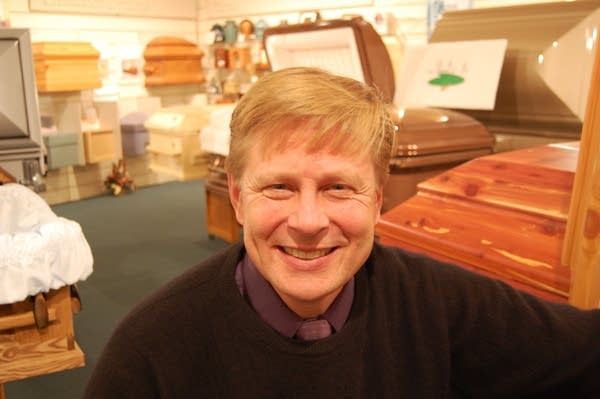Funeral business might not be as recession-proof as once thought
Go Deeper.
Create an account or log in to save stories.
Like this?
Thanks for liking this story! We have added it to a list of your favorite stories.

In past downturns, the funeral business has been able to weather economic storms with little trouble. But this recession may be different.
"What our members are telling us is that they're most definitely feeling the effects of the economy," said Jennifer Koth, a spokesperson for the National Funeral Directors Association.

Koth says a growing number of families are choosing less expensive caskets for their loved ones. They're cutting back on flowers and shortening the length of visitation services, all as a way to save money.
There's also a rise in the number of families who cannot pay funeral costs at all, especially in regions with high unemployment. That means burial costs are increasingly falling on local or state governments.
Turn Up Your Support
MPR News helps you turn down the noise and build shared understanding. Turn up your support for this public resource and keep trusted journalism accessible to all.
The National Funeral Directors Association even lobbied Congress to help states pay for burials for families in economic crisis. The goal was to get that funding included in the economic stimulus package now under debate. The move now appears unlikely.
There are other, more long term trends affecting the funeral business. Cremation is typically cheaper than a traditional funeral, and it's growing in popularity.
In 2007 in Minnesota, 42 percent of people who died were cremated. That number has doubled just since the mid-1990s.
"In these economic times, I think people are looking at the cremation option as a way to do the funeral at a lower cost."
The cremation trend affects the livelihood of State Sen. Paul Koering. When Koering is not at the state Capitol, he runs a hearse business that serves several funeral homes in the Brainerd area.
"Obviously, if you have your loved one cremated, you don't need a hearse," Koering said. "I think that in these economic times, people are looking at the cremation option as a way to do the funeral at a lower cost."
Cremation statistics aren't in yet for 2008, but some expect a spike in the numbers as people look for additional ways to cut back on funeral expenses.
Kevin Cease is funeral director at his family's business. His grandfather started the business in the 1920s. Today, he and his siblings, a sister and two brothers, run six funeral homes in north central Minnesota.
So far, the recession hasn't had a big impact on his business.
Stepping onto the showroom floor of Cease's facility in Bemidji, it's clear that dying isn't cheap these days.
"We have caskets that range from $895 for a grayish cloth-covered casket, nice white satin interior," said Cease. "It looks nice and is very reasonably priced, and it goes all the way over here to a bronze casket that we have listed at $7,500."

Add up other costs like embalming, cemetery vaults and ceremonies, and people typically pay more than $7,000 for a funeral. That's not counting a cemetery plot or a headstone.
That's a lot of money for families in north central Minnesota, which has high rates of poverty.
Kevin Cease says he's always seen families who struggle to pay for a funeral, and he expects he'll see more as the recession deepens.
"There are many families in our area that are just really on the edge as far as finances," said Cease. "It's really, really tough to go through a tough economic time and then also get this, it's almost a double whammy for somebody to encounter a death. It's just overwhelming."
Cease figures as the recession drags on, more families will cut back on funeral expenses. That's made the Cease family more cautious about their business decisions. They'd planned on purchasing a new hearse in January, but that's been put on hold.
Cease says his main goal has always been to help families have a meaningful experience when a loved one dies. And he knows that's possible, even on a limited budget.
"Are we all going to get through this together? You bet we are," said Cease. "It happened in my grandfather's time in the depression era. I know we're going to get through it the same way this time."
Perhaps the biggest change for the funeral business is still on the horizon. As baby boomers age in the U.S., the death rate is expected to rise considerably over the next few decades.





